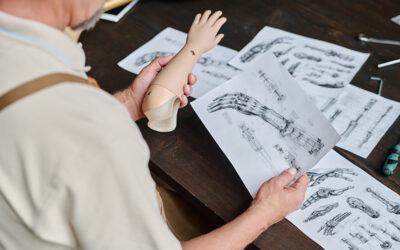Anterior cervical discectomy and fusion (ACDF) is a surgical procedure performed to remove a herniated or degenerative disc from the neck area. The surgery aims to relieve spinal cord or nerve root pressure and alleviate chronic pain, weakness, numbness and tingling sensation in the neck and back area that occurs due to a problem with the discs. The surgical procedure is anterior as the surgeon accesses the disc through the front of the neck, rather than through the back. Neurosurgery medical billing and coding can be challenging. Outsourcing these tasks to an experienced medical billing company is a great way to save valuable time and ensure accurate coding and claim submission.
Typically, the discs of the spinal column allow comfortable movement. However, certain factors like age, injuries and certain degenerative conditions (like arthritis) can cause severe damage to the discs. The discs may become thin, dry out, swell or bulge, resulting in inadequate cushioning. This can cause pain that can range from moderate to intense and radiate to other areas of the body, leading to headaches, and back and shoulder pain.
What is ACDF Surgery and How is it Performed?
Between each of the spinal column is a cushion called an “in vertebral disc” – that prevents the bones from rubbing against each other. These discs act as shock absorbers during falls, exercise and daily activities. These discs can become damaged causing moderate to intense pain.
An ACDF procedure can be performed on any of the discs in between the seven cervical bones, anywhere along the spine from the neck (cervical) to the low back (lumbar). The surgeon reaches the damaged disc from the front area (anterior) of the spine via the throat area. The front or anterior position provides better access to the disc than from the back area (posterior position). It allows the disc to be reached without disturbing the spinal cord, spinal nerves and neck muscles. Based on the specific symptoms, one disc (single-level) or more (multi-level) may be removed. Once the disc is removed, the space between the bony vertebrae becomes empty. In order to prevent the vertebrae from rubbing and collapsing against each other, a bone graft is inserted to fill the open disc space. Following the surgery, the body’s natural healing process will promote new bone cell growth around the graft. After 3-6 months, the bone graft will join the two vertebrae and form one solid piece of bone.
ACDF is performed as an outpatient procedure and patients can return home the same day. Any pain and range of motion loss can be easily managed with pain medications. Recovery will take several weeks, and patients may need to wear a collar to stabilize the neck.
CPT Codes for Anterior Cervical Discectomy & Fusion
- 22548 Arthrodesis, anterior transoral or extraoral technique, clivus-C1-C2, with or without excision of odontoid process
- 22551 Arthrodesis, anterior interbody, including disc space preparation, discectomy, osteophytectomy and decompression of spinal cord and/or nerve roots; cervical below C2
- 22552 Arthrodesis, anterior interbody, including disc space preparation, discectomy, osteophytectomy and decompression of spinal cord and/or nerve roots; cervical below C2, each additional interspace
- 22554 Arthrodesis, anterior interbody technique, including minimal discectomy to prepare interspace; cervical below C2
- 22585 Arthrodesis, anterior interbody technique, including minimal discectomy to prepare interspace; each additional interspace
- 22590 Arthrodesis, posterior technique, craniocervical
- 22595 Arthrodesis, posterior technique, atlas-axis
- 22600 Arthrodesis, posterior or posterolateral technique, single level; cervical below C2 segment
- 22614 Arthrodesis, posterior or posterolateral technique, single level; each additional vertebral segment
- 22856 Total disc arthroplasty, anterior approach, including discectomy with end plate preparation; single interspace, cervical
- 22861 Revision including replacement of total disc arthroplasty, anterior approach, single interspace; cervical
- 22864 Removal of total disc arthroplasty, anterior approach, single interspace; cervical
- 22858 Total disc arthroplasty, anterior approach, including discectomy with end plate preparation; second level, cervical
- 0098T Revision including replacement of total disc arthroplasty, anterior approach, each additional interspace, cervical
- 0095T Removal of total disc arthroplasty, anterior approach, each additional interspace, cervical
- 63001 Laminectomy with exploration and/or decompression of spinal cord and/or cauda equina, without facetectomy, foraminotomy or discectomy, 1 or 2 vertebral segments; cervical
- 63015 Laminectomy with exploration and/or decompression of spinal cord and/or cauda equina, without facetectomy, foraminotomy or discectomy, more than 2 vertebral segments; cervical
- 63020 Laminotomy, with decompression of nerve root(s), including partial facetectomy, foraminotomy and/or excision of herniated intervertebral disc; 1 interspace, cervical
- 63040 Laminotomy, with decompression of nerve root(s), including partial facetectomy, foraminotomy and/or excision of herniated intervertebral disc, reexploration, single interspace; cervical
- 63045 Laminectomy, facetectomy and foraminotomy, (unilateral or bilateral with decompression of spinal cord, cauda equine and/or nerve root[s]
- 63050 Laminoplasty, cervical, with decompression of the spinal cord, 2 or more vertebral segments;
- 63051 Laminoplasty, cervical, with decompression of the spinal cord, 2 or more vertebral segments; with reconstruction of the posterior bony elements
- 63035 Laminotomy, with decompression of nerve root(s), including partial facetectomy, foraminotomy and/or excision of herniated intervertebral disc; each additional interspace, cervical or lumbar
- 63043 Laminotomy, with decompression of nerve root(s), including partial facetectomy, foraminotomy and/or excision of herniated intervertebral disc, reexploration, single interspace; each additional cervical interspace
- +63048 Laminectomy, facetectomy and foraminotomy, (unilateral or bilateral with decompression of spinal cord, cauda equine and/or nerve root[s]
- 63075 Discectomy, anterior, with decompression of spinal cord and/or nerve root(s), including osteophytectomy; cervical, single interspace
- +63076 Discectomy, anterior, with decompression of spinal cord and/or nerve root(s),including osteophytectomy; cervical, each additional interspace
- 63081Vertebral corpectomy (vertebral body resection), partial or complete, anteriorapproach with decompression of spinal cord and/or nerve root(s); cervical, singlesegment
- 63082 Vertebral corpectomy (vertebral body resection), partial or complete, anterior approach with decompression of spinal cord and/or nerve root(s); cervical, each additional segment
- 63300 Vertebral corpectomy (vertebral body resection), partial or complete, for excision of intraspinal lesion, single segment; extradural, cervical
- 63304 Vertebral corpectomy (vertebral body resection), partial or complete, for excision of intraspinal lesion, single segment; intradural, cervical
- 63308 Vertebral corpectomy (vertebral body resection), partial or complete, for excision of intraspinal lesion, single segment; each additional segment
Like all surgical procedures, ACDF comes with certain risks. The procedure is generally uncomplicated and most patients return to a normal life. However, before going ahead with the procedure, people need to carefully compare the benefits of surgery against the risks and make an informed decision.
Billing and coding for neurosurgical procedures can be complex. Neurosurgeons can rely a competent medical billing and coding company to report their services accurately on the medical claims.




